Transcript of Copthorne
Macdonald’s April 2, 2006 address to the
University Unitarian Universalist Society in
PERSONAL
AND SOCIETAL WISDOM:
Some thoughts on their nature and development
This morning I want
to share some thoughts with you about the nature and development of personal
wisdom and its offshoot, socio-cultural wisdom. There will be some overlap
between this talk and the longer one I’ll be giving next Wednesday evening
at
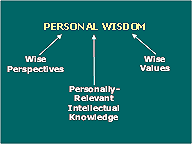
Let’s start with personal wisdom. At every moment in our lives we face some real-life situation, some fact-based reality. What do those facts mean? And what’s the best thing to do about them? Wisdom answers the meaning question by looking at the situation from a variety of helpful perspectives. It answers the action question by bringing wise values into the decision-making process. There are many of these helpful perspectives, or “wise ways of seeing.” There are also many “wise values.” In wise people these basic building blocks of wisdom combine in various ways to create an array of “wise attitudes” and “wise ways of being.” And because the mix of characteristics differs from person to person, each wise person’s wisdom has a distinctive character or “flavor.”
A key point is that personal wisdom is internal, embodied by persons. Words of wisdom arise from it. Wise behavior arises from it. Socio-Cultural wisdom arises from it. But wisdom itself is not its products. Rather, it is a mode of cognition — one that couples relevant intellectual knowledge with some important perspectives, interpretations, and values. Wisdom is a kind of meta-knowledge that helps us make better sense of the rest of our knowledge.
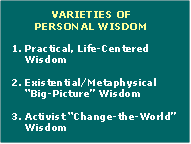
Aristotle differentiated between two varieties of wisdom: one having a practical everyday-life focus, the other an existential, metaphysical focus. I would add a third variety, wisdom that has an activist, change-the-world focus.
Life-centered wisdom is an information-processing modality in which everyday situations are evaluated from multiple perspectives, multiple contextual points of view. Howard Gardner wrote, “The defining characteristic of wisdom is the breadth of considerations taken into account when rendering a judgment or recommencing a course of action.” Common evaluative contexts include the pragmatic, Will this work? What are the consequences? Does this fit with my goals? Is this part of the problem or part of the solution? Does this represent excellence? Is action needed or not needed?
And there are many others, including a variety of ethics–, morality–, and justice–related contexts.
Big picture, existential wisdom is a variety that Eastern spiritual practices help to develop. Rational evaluation still plays a role in this form of wisdom, but rationality is not enough. That’s because the goal is insight into both the informational aspect of reality (that is, form and appearance) and the noninformational aspect (Being, Spirit, Energy, Awareness). Eastern practices develop and harness the psychological modalities of intuition and identification. These modes of cognition potentially allow us to see beyond the transient to the eternal. Beyond maya to Brahman. Beyond form to the carrier of form.
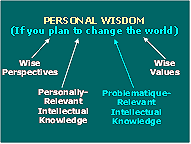
Activist wisdom starts with a well-developed foundation of personal wisdom. But the wise person who wants to change the world adds to that foundation an intellectual and experiential understanding of the world situation.
Through reading and direct experience they explore the world problematique — that matrix of interconnected problems the world faces. Wise Activists then focus on some limited part of it, and devote their time, energy, and wisdom to changing it for the better.
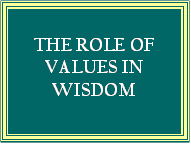
The embracing of “high” or “superior” values is a hallmark of wisdom. High values have two roles in the lives of wise people. First, they can provide illuminating slants on the data of life. Second, they guide the decision-making process toward wiser decisions.
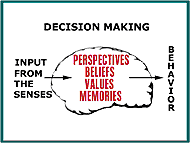
Brain processes and their values work together to make our decisions and control our behavior in much the same way that a computer’s hardware and software work together to make the computer’s decisions and control its outputs.
The brain is the hardware of our behavioral control system. The elements in red constitute the heart of the software. They work together to make our decisions. Information about the immediate situation is presented to the brain by our senses. The brain also has access to memories of other situations and other decisions as well as previously acquired knowledge and perspectives. At the heart of the process is our hierarchy of internalized values. In ways we don’t yet understand, the brain takes these informational elements and arrives at a response to the situation — a decision to act in some particular way, or not to act at all.
Playing a central role in all this are the values. Roger Sperry, who won a Nobel Prize for his split-brain research, put it this way:
“Human values...can...be viewed objectively as universal determinants in all human decision making. All decisions boil down to a choice among alternatives of what is most valued, for whatever reasons, and are determined by the particular value system that prevails.” I would add a corollary: superior values, “the values of the wise,” produce superior decisions and superior behavior.
What are those superior values? There are many lists, and on The Wisdom Page there is a document that contains several of them. Here, we’ll look at just one.
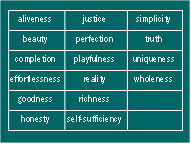
The self-actualizing and ego-transcending people that Abraham Maslow studied were wise people. And Maslow’s reports on their behavior and mindsets tell us a lot about the nature of wisdom and the values that underlie it. Maslow’s self-actualizers focused on concerns outside of themselves; they liked solitude and privacy more than the average person, and they tended to be more detached than ordinary from the dictates and expectations of their culture. They were inner-directed people. They were creative, too, and appreciated the world around them with a sense of awe and wonder. In love relationships they respected the other’s individuality and felt joy at the other’s successes. They gave more love than most people, and needed less. On the screen is a set of values that were central to their lives. Maslow called them the Being-Values, or B-Values.
Early this morning
Alan Nordstrom sent me a poem which fits very nicely here. It is by a
poet named Barnabe Googe, and is entitled WISDOM:
What is this thing we WISDOM call?
An act it is, no thing at all:
To choose to do that which will bring
The happiest of everything
To everyone is WISDOM’s aim;
That we do not, is our shame.
A final word about values before we move on. In my comments about values I’ve been referring to a person’s deep down, internalized, operational values. These are not necessarily the same as a person’s professed values. The internalized values reveal themselves in behavior. The professed values may be there only in words. To understand what values are really in control, we can work back from behavior — our own behavior and that of other people.
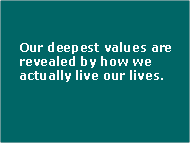
Pleasing to us or not, there it is.
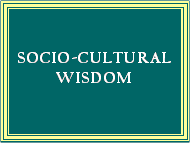
Let’s switch our attention now to socio-cultural wisdom. Societal institutions — corporations, political systems, economies, NGOs — are purposeful entities. They exist to perform certain functions and to behave in certain ways. And that behavior is directed by values. Those values are typically a combination of
-
the personal values of the people who created the institutions in the first place,
-
the values of the people who currently run them, and
-
values imposed from outside, such as laws enacted by governments and the interpretation of those laws by courts.
Some institutions
were imbued with wise values at their founding, but were co-opted later.
Among the drafters of the US Constitution and Bill of Rights were some
very wise people, and that wisdom was reflected in the governmental structures
they created. But they couldn’t anticipate every future happening, nor
build into the constitution ever possible protection. As early as the
1860s
Economies are another example. Economies were created as societal subsystems to provision people. Group A had more of some good than it needed, and it traded the excess to Group B for a different good. The provisioning function hasn’t disappeared, but today’s economies and their institutions have superimposed other purposes on top of the original one. Making a lot of money for a small group of people has become the primary purpose; benefits to society are secondary. The economic tail now wags the societal dog.
It doesn’t have to be this way. Governments can be configured to serve the many instead of the few. And the original purpose of economies can be restored.
In my view, a wisdom-based society would be one in which many of the high values that guide the lives of wise people would also guide society’s institutions. Among those values would be truth, honesty, justice, cooperation, peace, compassion, universal well-being, creativity, and comprehensive knowledge. These values would be implanted into institutional systems in ways that insured, as far as possible, wise institutional behavior. And there would be safeguards in place to insure that those values would be maintained on into the future.
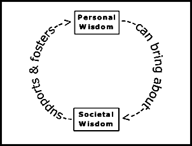
We’re going to move shortly to the development of personal wisdom, but first I’d like to touch on the back and forth relationship between the personal and the societal. It starts with personal wisdom. If a societal institution ends up being guided by wise values, it is almost certainly because wise people designed them in. So there is a creative movement from wise people to wise institutions. But it also works in the other direction. Wise societal institutions support and encourage the development of wisdom in individuals.
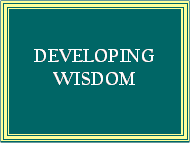
If we want to become wiser people, we can develop the characteristics of wisdom — the relevant perspectives, and values, and intellectual knowledge — and incorporate them into our lives. We’ll look now at some tools to help us do that.
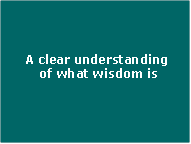
This talk is a brief introduction to the subject of wisdom. Back in 1995 I started The Wisdom Page, now located at www.wisdompage.com. Check it out if you’re interested in digging further into the subject. There you can find links to many free resources concerning wisdom, as well as information about helpful books, audio, and video materials.
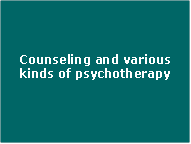
Becoming a wiser person is an exercise in inner development, and there are activities that can help us along the way. Counseling and other forms of psychotherapy can, if we need them, help us reach the starting point for advanced work which we might call responsible adulthood or mature ego.
A person at this stage is free of psychoses and crippling neuroses and has developed emotional control and empathy to an ordinary degree. As I’m sure you know, there are many forms of therapy, including life management counseling, therapies to help us get over fears, therapies to help us manage anger, therapies to help us get over compulsions and addictions, and others.
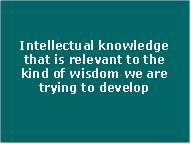
Novels and biographies are valuable resources for the development of practical wisdom because they present us with countless examples of wise and unwise behavior, skillful and unskillful handling of life situations. Biographies of wise people can be especially helpful. How does their behavior differ from ordinary? What values guide their lives? What perspectives and interpretations of life situations have they made use of?
For those who would like to develop existential, metaphysical, spiritual wisdom, the world’s spiritual literature is a vital intellectual resource. There is also an extensive literature on specific go-see-for-yourself spiritual practices — practices that take the practitioner to deeper levels of understanding than reading can. Also helpful in developing the “Big Picture” view are books that deal with the nature of mental and physical reality, the cosmos, and evolution.
If we want to be effective change agents, then we need to select resources relevant to the kinds of change we are trying to bring about. Among the possibilities are the “new disciplines,” including the sciences of complexity, cosmos-wide evolution, and the human brain/mind system. Important for many would be learning more about human cultures, economic systems, and the biosphere.
Of general importance is an understanding of ethics and techniques for changing ethical perspectives; probability as a decision-making tool; the techniques of conflict resolution and effective persuasion; and information on current transformational activities.
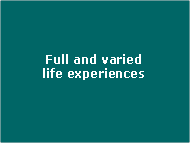
If we are open to learning, life itself teaches us. Having many and varied life experiences obviously teaches us more. We not only need to structure our life so that we have many kinds of experience, but we also need an open, curious, inquisitive, appreciative mental stance so that we get the most out of whatever experiences we have. Travel; getting to know people with different skills, outlooks, and values; engaging in different kinds of work; taking up a variety of hobbies — all these things enrich our life and potentially take us further down the wisdom-development path.
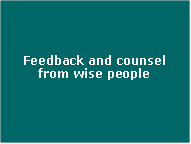
Hanging out with people who are already living the values we’d like to make our own can be most helpful. Where do we find such people? Right here for one thing. Groups that focus on personal growth and doing good in the world — groups such as Unitarian/Universalists, Quakers, and Buddhists — are a best bet. Local and online discussion and activist groups are another possibility. Some of these focus on psychological or spiritual growth. Others focus on various social issues. We can experiment, and when we find groups that feel right, get involved.
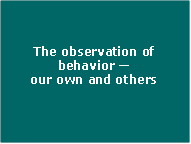
People all around us are struggling to up level their lives — some skillfully and successfully, others very unskillfully and unsuccessfully. The world’s literature and films present us with countless additional life stories.
What can we learn from them? Can we pick out the strategies and behaviors that work and those that don’t? Can we start to sense some general “laws of life” behind the specifics? And can we learn to pay attention to our own behavior, and become aware of the underlying values?
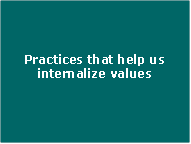
Becoming clear about
the values we would like at the center of our lives — the values we want
to make truly our own in a deep and powerful way — is the first step.
The challenge then is to move these values from our head to our heart
and our guts. In psychological terms, we must internalize them
so they are not merely nice thoughts, but actually guide our behavior.
Doing this takes effort, and during one of his trips to
By making the effort to engage in value-based action — again, and again, and again — we eventually internalize the value. Expressing the value in action gradually takes less and less effort until it becomes part of our outlook, part of our natural way of being, part of who we are.
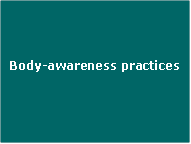
In our culture we fill our waking hours with discursive thinking. We think about the past. We think about the future. We plan. We solve problems. Wisdom, however, demands that we spend a lot of time paying attention to what is happening in our immediate situation. Body awareness practices such has hatha yoga, Tai Chi, Vipassana meditation, and many sports can help us break the mind-tripping habit.
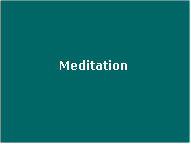
The last tool I’ll mention — though definitely not the least — is meditation. In fact, meditation is generally considered to be the most powerful single tool for developing wisdom. Psychologist Jane Loevinger’s research produced a 9-stage scale of psychological development. The terms she uses for the two highest stages are “autonomous” and “integrated.” It turns out that less than 2 percent of the general adult population have managed to reach these top two categories. However, for people who have had a meditation practice going for several years, that number is 38 percent.
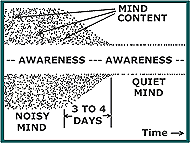
Meditation retreats of 7 to 10 days duration are especially helpful. This graphic might help get that idea across. At the left we have the usual noisy-mind situation. Pure quiet awareness is there as the substrate of the mind, but it is modulated by a lot of high-intensity information — thoughts, sensations, emotions, etc. — much mind content. At the right, the graphic depicts the quiet mind. This is not sleep. The person is highly alert and aware, but the quantity and intensity of mental information is way down.
The transitional slope between one state and the other depicts what happens during the first 3 or 4 days of a meditation retreat. The key to going from a noisy mind to a quiet mind is paying attention to something subtle. Why? Because we can’t think discursively and pay close attention at the same time.
In a sense, the noisy mind is a habit. A quiet mind is a different kind of habit. It turns out that if we spend several days paying attention to subtle bodily sensations — like those arising in the nostrils when we breath, and those arising in feet and legs when we walk, the mind gradually shifts from habitual noisiness to habitual quietude. It usually take 3 to 4 days of diligent morning-to-night effort in a supportive environment to make the switch. But once you’ve entered the quiet-mind mode, interesting things start to happen.
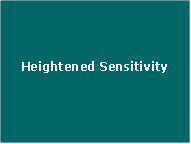
For one thing, you have become more sensitive to your surroundings. With the mind quiet, many people find themselves looking at the natural world around them with a new sense of wonder. And insights may arise about our relationship to nature and cosmos.
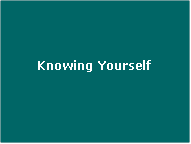
“Know thyself,” said the Greeks. And when the mind is quiet, that begins to happen in a serious way. Normally, we identify strongly with the busy, buzzy mind content that constitutes the melodrama of our life. We see this unfolding informational story as me. When the mind is quiet, however, we have a certain detachment. We are no longer overwhelmed by massive amounts of mind content, and are not so identified with what remains. We begin to see how our mind works, and may eventually get a glimpse of who “I” really am.
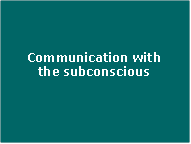
A quiet mind also opens the door to the subconscious. Mental quiet thins the barrier that exists between conscious and subconscious mental processes. Messages from our subconscious are better able to bubble up into consciousness. We may start to see things about ourselves that we were never conscious of before, things that we’ve been pushing out of awareness.
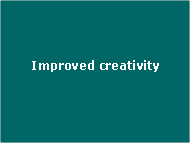
Improved creativity
is another benefit of quieting the mind. Under quiet mind conditions,
the intuitive process’s creative Muse is able to communicate effectively
with the intellect and the global workspace of the mind. The number of
Aha! and
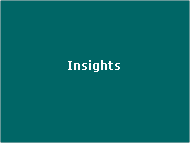
Another plus: when the mind is quiet, insightful shifts of perspective can occur. We suddenly apply a new interpretive framework to the same old facts and see things in a dramatically different way.
I discuss still more benefits of meditation in my books Toward Wisdom and Matters of Consequence. And I’ve put some of this information on line. The Wisdom Page also has links to information concerning meditation retreats.
Thank you for being so attentive, and if you have questions, I guess now is the time.